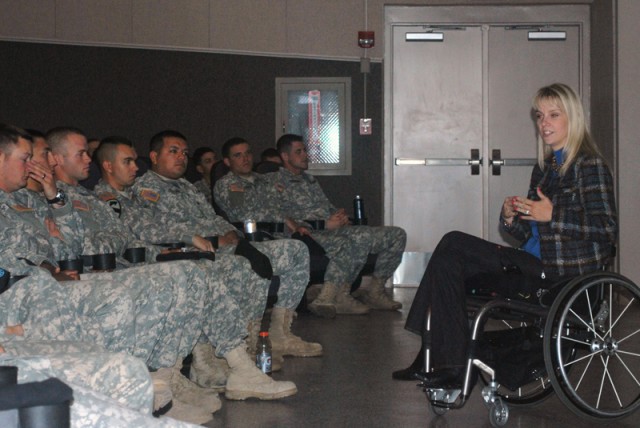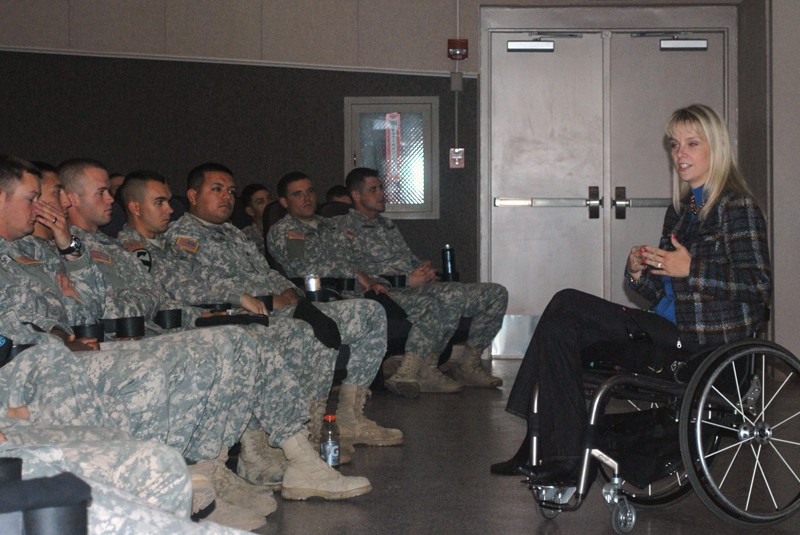FORT RILEY, Kan. - Kelly Narowski got out of the passenger's side of her friend's Jeep Wrangler and ran over to the driver's side because her friend was too drunk to drive. After her friend buckled up, Narowski started driving down the road. She wasn't wearing her seatbelt.
"I remember getting out of the car, and I remember what I was wearing and how the mountains and the sky looked," Narowski said. "It was the last time I ever walked."
Narowski spoke with more than 2,400 Soldiers Oct. 19 to 21 at Barlow Theater, as part of the Garrison Safety Office's "Driving Under the Influence and Crash prevention" campaign.
Before heading out to a jazz festival on the beach one afternoon, Narowski stopped by her friend Heather's house.
Heather had already had between six and eight martinis by the time she arrived, Narowski said.
"I wasn't a drinker. I was a bit of a health fanatic," she said. "But I decided to have two drinks with her that day."
They hopped into Heather's Jeep Wrangler and started driving on California State Road 1, commonly called Highway 1 - a curvy, mountain road.
Heather pulled the car over and told Narowski she had to drive because she was too drunk.
"My first thought was, 'Well you're always drunk, so it must be really bad this time,'" Narowski said. "I switched places with her."
Heather had her seatbelt on. Narowski did not.
"We were in deep conversation. Here I am with two drinks in my system, and I'm with someone who's had a lot to drink, and I'm on a curvy mountain road - a dangerous road - and I'm in an unfamiliar vehicle and now we're talking. Kind of a recipe for disaster," she said.
Narowski turned the wheel to the right, and the Jeep went left and hit the guard rail.
"My body was pushed very, very hard into the steering wheel, and I broke my ribs, collarbone, (and) my lungs were collapsed and full of blood," she said.
The Jeep collided with the guard rail a second time, sending Narowski flying inside the car until she ended up in the backseat.
"My body flew around the Jeep like a ragdoll, and it ended up in the backseat, and my body was going 70 miles an hour," she said.
Narowski shattered her T6 vertebrae.
"It exploded like a grenade. My spinal cord was stretched like a piece of taffy, and I was paralyzed from the chest down forever from that moment in time on," she said.
The next thing she remembers, she said, is the paramedics telling her not to move, and then lying on a hard wooden table in the hospital.
Narowski stayed in the intensive care unit for a month and underwent eight surgeries.
During one of her surgeries to drain the fluid from her lungs, she was given the wrong anesthetic. It paralyzed her movement, but not her ability to feel.
"I could feel that surgery. I could feel them working on my lungs that whole time, and I couldn't tell them to stop. I'll never forget that. And that kind of trauma and that kind of hardship is a direct result of what I did to myself in a car making stupid choices," she said.
Narowski went into rehabilitation to learn to live life as a wheelchair user.
"Heather walked away without a scratch and that's the difference between a seatbelt and no seatbelt," she said.
Narowski said the toughest thing after all these years of being a wheelchair user is being patronized.
"I get patronized, and I hate it. That's the first thing people see is a wheelchair, and they see you as different from them, and they want to label you," she said.
She urged Soldiers in the audience to develop a sense of personal safety and take care of themselves.
"As U.S. Soldiers, you stand for what's right in the world. You're all high-quality people. You're country needs you. Please take care of yourself. So please, think first and be safe," she said.
Narowski told the Soldiers they wouldn't go into combat without body armor and to think of their seatbelt as body armor in the car.
"There are drunk drivers, and there are aggressive drivers, and there are distracted drivers. A seatbelt will prevent you in an event of an attack from one of those bad drivers," she said.
Narowski said some Soldiers come back from the worst places in the world with a false sense of invincibility.
"Statistically, in 2010, you are more likely to die on a U.S. road as a U.S. Soldier than you are in combat," she said.
Narowski, who is married to a Soldier, said she understands the long hours they work and urged the Soldiers to get enough rest before getting behind the wheel of a car.
"You keep doing it, keep playing Roulette every time you get in the car, eventually you're going to lose," she said.
On Oct. 21, Narowski gave a special presentation to Fort Riley's civilian workforce.
She asked the audience to think twice before texting while driving and pay attention to the job of driving.
"Texting while driving is completely absurd to me. I don't understand how anybody thinks they can text and drive, but it's a big problem," she said.
Rick Hearron, garrison safety manager, said he wanted to bring Narowski to speak with Soldiers, Resilient Spouse Academy participants and civilian workers as part of the campaign, and also because of the upcoming holiday season.
"Looking at some of the faces during her presentation, I could tell she was opening up some eyes. Anything we can do to get at the prevention of drinking and driving and texting while driving, we will try," he said.
Related Links:
U.S. Army Combat Readiness/Safety Center: POV & Motorcycle Safety


Social Sharing